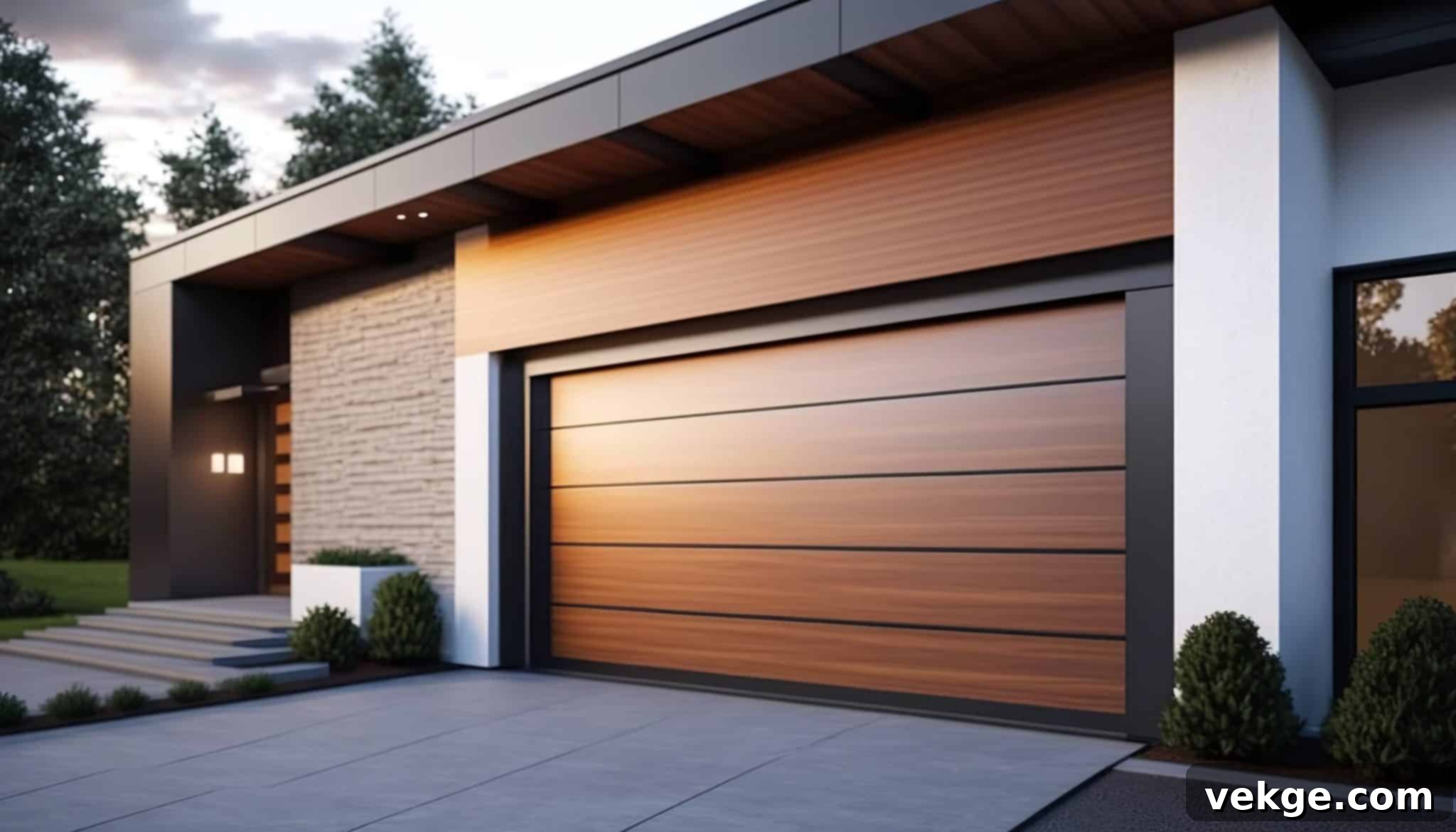The Ultimate Guide to Custom Garage Door Materials: Style, Durability, and Performance
The garage door is often the largest moving component of your home and a dominant feature of its exterior. Far more than just a functional entry point, a well-chosen garage door significantly impacts your property’s overall curb appeal, security, and energy efficiency. Selecting the right material for your custom garage door is a crucial decision that blends aesthetics with practicality, influencing everything from maintenance requirements to long-term durability and how your home is perceived.
This comprehensive guide delves into the diverse range of materials available for custom garage doors. We’ll explore the unique characteristics, advantages, and considerations for each option, empowering you to make an informed choice that perfectly aligns with your home’s architectural style, local climate conditions, personal preferences, and budget. Whether you’re aiming for a classic charm, a sleek modern look, or robust resilience, understanding these materials is the first step toward transforming your home’s facade.
Wood Garage Doors
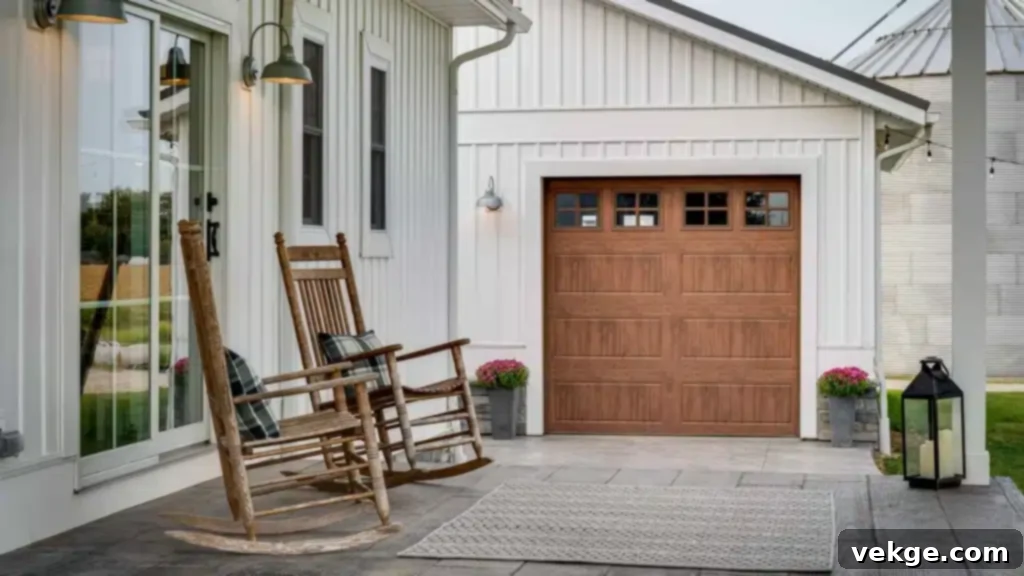
For homeowners seeking unmatched elegance and a timeless aesthetic, wood garage doors stand as a quintessential choice. Known for their natural beauty and warmth, wood doors offer an incredible degree of customization, capable of complementing any architectural style from traditional colonial to rustic farmhouse, and even modern designs. The rich, organic grain patterns and varied finishes create a sophisticated and inviting curb appeal that few other materials can replicate. Beyond aesthetics, wood can provide good insulation properties, especially when constructed with multiple layers.
However, the beauty of wood comes with specific maintenance considerations. To preserve its integrity and appearance, wood requires regular upkeep to prevent issues such as warping, rotting, cracking, and pest infestations. This includes periodic painting, staining, or sealing, especially in climates with significant humidity fluctuations or extreme weather. Despite the maintenance, for those who prioritize a premium look and are willing to invest in its care, wood remains a highly desirable option for a truly custom and luxurious garage door.
Here are some essential tips for choosing and maintaining wood for your custom garage door:
- Choose Durable Wood Species: Opt for naturally resistant hardwoods like cedar, redwood, mahogany, or cypress for superior moisture resistance, insect deterrence, and longevity.
- Prioritize Protective Finishes: Apply high-quality protective finishes, stains, or paints and schedule regular treatments. This is especially crucial in wet, humid, or harsh climates to prevent premature deterioration.
- Match Your Home’s Style: Wood garage doors can be crafted with various panel designs, window inserts, and decorative hardware. Select a style that perfectly harmonizes with your home’s existing architecture and exterior elements.
- Consider Insulation Options: While wood is naturally insulating, discuss options for added insulation layers to improve thermal performance and energy efficiency, particularly in extreme climates.
- Regular Inspections: Periodically inspect your wooden garage door for any signs of cracking, peeling paint, rot, or insect activity, addressing issues promptly to prevent further damage.
Glass Garage Doors
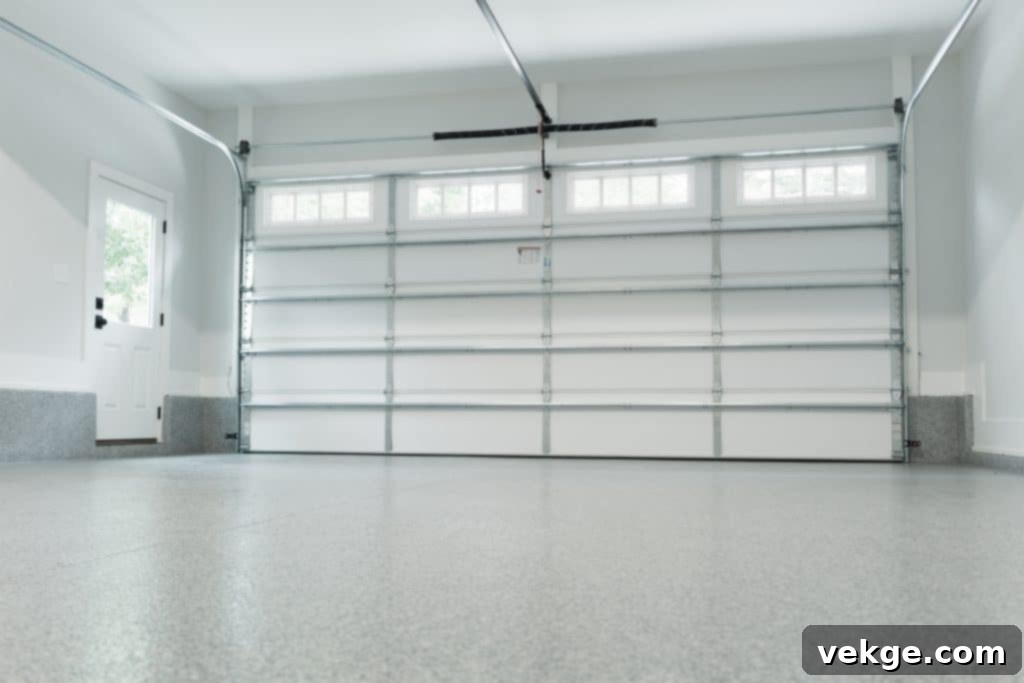
For contemporary homes and properties embracing a sleek, minimalist aesthetic, glass garage doors are an excellent choice. Typically framed in durable aluminum, these doors offer a distinctive modern look, allowing an abundance of natural light to flood the garage interior. This creates a seamless visual connection between your indoor and outdoor spaces, making them particularly ideal for garages that function as workshops, home gyms, art studios, or additional living areas rather than just car storage.
The advantages of glass garage doors extend beyond their striking appearance. They instantly elevate the aesthetic appeal and enhance the functionality of your garage space. However, it’s important to consider that glass requires more frequent cleaning to maintain its pristine look and is generally more susceptible to breakage compared to solid materials like steel or wood. Advances in glass technology, such as tempered and insulated options, have significantly improved their durability and energy performance, offering a balance of style and practicality.
Here are some tips for selecting the perfect glass for your custom garage door:
- Opt for Enhanced Glass Options: Choose double-paned, insulated, or even low-E coated glass for superior temperature control, noise reduction, and energy efficiency. This is crucial for conditioned garage spaces.
- Select a Robust Aluminum Frame: Ensure the aluminum frame is sturdy and complements your home’s design. Aluminum provides the necessary strength and resistance to corrosion, essential for supporting the glass panels.
- Consider Privacy and Light Control: If your garage faces a busy street or close neighbors, opt for frosted, tinted, or obscure glass options to maintain privacy without sacrificing natural light.
- Maintenance Commitment: Be prepared for regular cleaning to keep the glass sparkling and free of streaks or smudges.
- Safety Features: Inquire about tempered glass, which shatters into small, blunt pieces rather than sharp shards, enhancing safety.
Steel Garage Doors
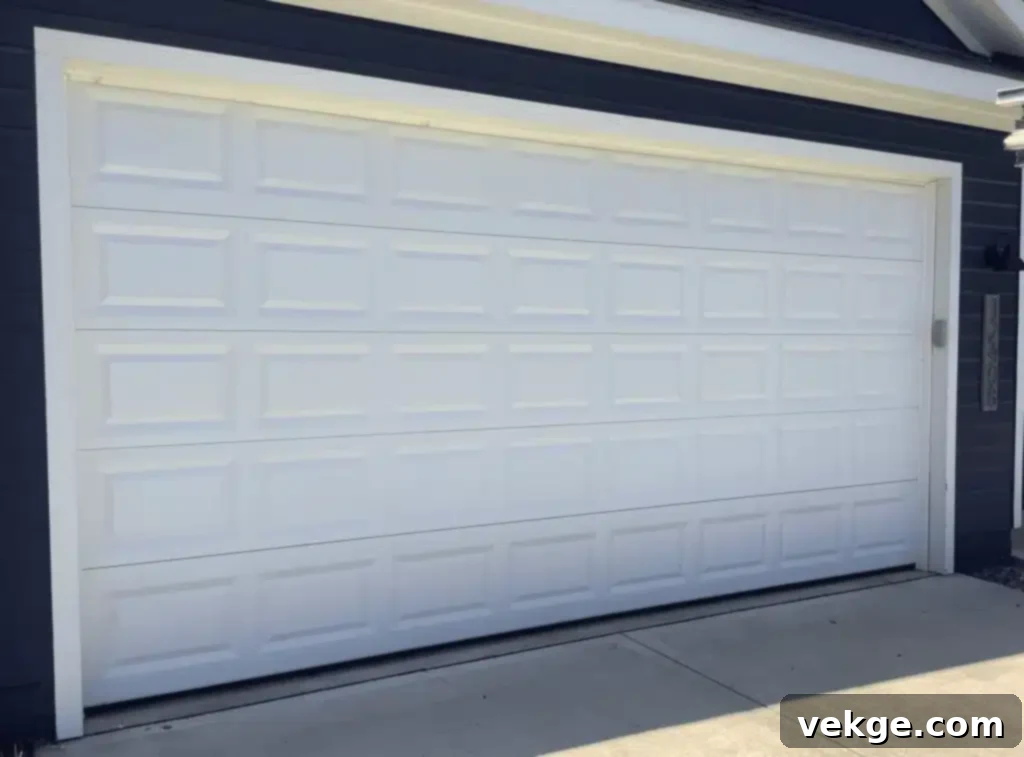
Steel garage doors are a perennial favorite due to their exceptional strength, minimal maintenance requirements, and versatility. This material is renowned for its ability to withstand harsh weather conditions, resist dents and impacts, and provide a high level of security against break-in attempts, making it a highly practical and durable choice for most homeowners. Modern steel doors are far from utilitarian; they come in an impressive array of styles, finishes, and colors, including sophisticated designs that convincingly mimic the look of natural wood without the associated upkeep.
A significant advantage of steel doors is their excellent potential for insulation. Many steel doors are available with layers of polyurethane or polystyrene insulation, substantially improving your garage’s energy efficiency. This helps regulate internal temperatures, reduces utility bills, and creates a more comfortable environment, whether your garage is used for parking, storage, or as a functional workspace. With proper care, a quality steel garage door can provide reliable service and maintain its attractive appearance for decades.
Here are some crucial tips for choosing steel for your custom garage door:
- Understand Gauge Numbers: Remember that lower gauge numbers indicate thicker, stronger steel. For enhanced durability and security, especially in areas prone to impacts or severe weather, opt for a lower gauge steel.
- Prioritize Insulation: Look for steel doors with high R-value insulation (polyurethane is generally superior to polystyrene) to significantly improve garage temperature control, reduce energy costs, and minimize noise transmission.
- Explore Aesthetic Options: Don’t limit yourself to a basic look. Consider steel doors with a composite overlay, a faux wood finish, or embossed patterns to achieve a high-end, custom appearance without the maintenance demands of real wood.
- Choose Rust-Resistant Coatings: Ensure the steel door features a multi-layer protective coating, including a galvanized layer and a baked-on primer and topcoat, to prevent rust and corrosion, especially vital for humid or coastal environments.
- Hardware and Components: Invest in high-quality hardware and components (rollers, hinges, springs) to ensure smooth, quiet operation and extended lifespan of your steel garage door.
Aluminum Garage Doors
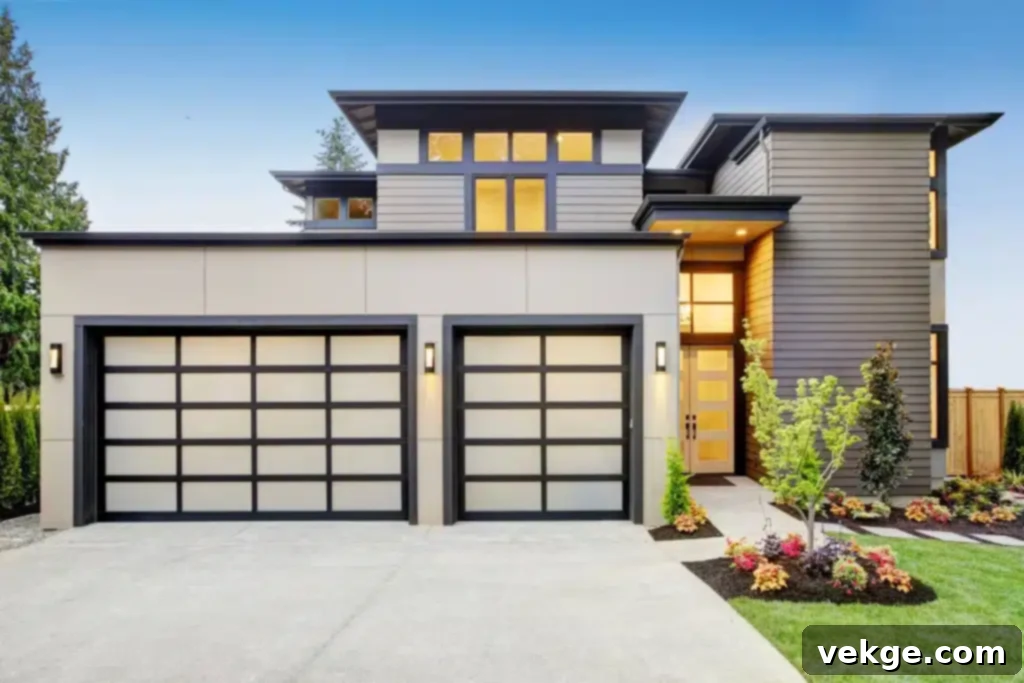
Aluminum garage doors are a compelling choice for homeowners seeking a lightweight, corrosion-resistant, and aesthetically versatile option. Their inherent resistance to rust makes them particularly ideal for humid environments, coastal regions where salt spray is a concern, and areas with heavy rainfall. Being significantly lighter than steel, aluminum doors place less stress on the automatic opener system, potentially extending its lifespan and ensuring smoother, quieter operation.
Modern aluminum garage doors are often designed with large glass panels, creating a distinctively contemporary or industrial aesthetic that perfectly complements modern and minimalist architecture. While generally less insulating than their steel counterparts (unless specifically designed with thermal breaks and insulation), their ease of maintenance and ability to resist environmental degradation make them a reliable and stylish choice. Aluminum offers a clean, sleek look that can be powder-coated in various colors to match any home exterior, providing both durability and design flexibility.
Here are some practical tips for choosing aluminum for your custom garage door:
- Prioritize Powder Coat Finish: Always opt for aluminum doors with a high-quality powder coat finish. This not only enhances their aesthetic appeal with a wide range of colors but also provides superior durability and protection against scratches, fading, and weathering.
- Embrace Modern Aesthetics: Aluminum excels in creating a sleek, contemporary style. Choose designs that incorporate large, clear, or frosted glass panels to maximize natural light and achieve a sophisticated, open look.
- Leverage Lightweight Benefits: Aluminum’s lightweight nature is highly beneficial for larger garage doors, reducing the strain on your garage door opener and extending its operational life. This also contributes to quieter operation.
- Consider Insulation Needs: If energy efficiency is a priority, inquire about insulated aluminum options. Many manufacturers offer aluminum doors with thermal breaks and insulated panels to improve their R-value and performance.
- Regular Cleaning: While rust-resistant, aluminum still benefits from occasional cleaning to remove dirt and grime, preserving its appearance and finish over time.
Vinyl Garage Doors
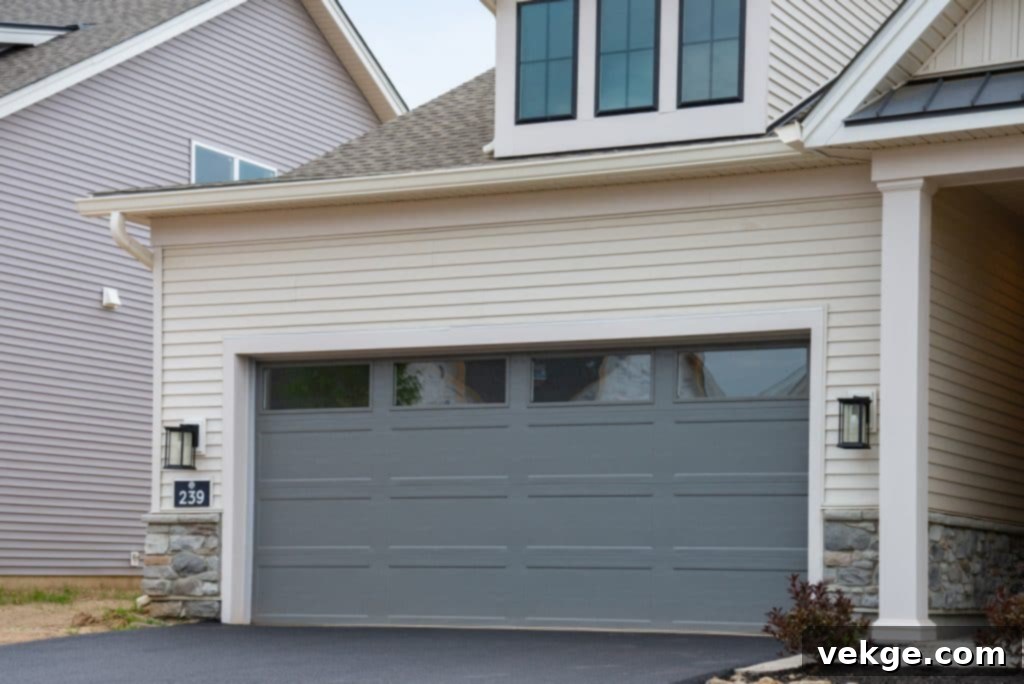
Vinyl garage doors are an outstanding option for homeowners who prioritize extreme durability and virtually maintenance-free performance. Engineered to resist dents, rust, and decay, vinyl doors are incredibly resilient and never require painting or staining, making them an ideal “set-it-and-forget-it” solution. This material truly excels in challenging environments, particularly coastal areas where salty air can quickly corrode other materials, or regions with severe weather changes. Their robust construction ensures they retain their color and finish remarkably well over many years.
While customization options for vinyl may be slightly more limited compared to the extensive design flexibility of wood or the sleek modernity of metal, vinyl offers a clean, consistent, and appealing look. They are an excellent choice for busy homeowners or those seeking a practical, long-lasting solution that stands up to daily wear and tear without constant attention. Modern vinyl doors can also be insulated to provide good thermal performance, adding to their value proposition for energy-conscious buyers.
Here are some key tips for choosing vinyl for your custom garage door:
- Select High-Quality, UV-Resistant Vinyl: To prevent fading, discoloration, and brittleness over time, always choose vinyl doors made from high-grade, UV-stabilized materials. This ensures your door maintains its aesthetic appeal for years.
- Ideal for Harsh Climates: Vinyl’s exceptional resistance to corrosion, salt air, and impact makes it the perfect material for homes near the ocean, in humid climates, or in snowy regions where roads are frequently salted.
- Choose Complementary Colors and Textures: While color options might be fewer, select a shade and texture that harmonizes with your home’s existing exterior siding, trim, and roofing to create a cohesive look.
- Consider Insulated Vinyl: For improved energy efficiency and temperature regulation within your garage, look for vinyl doors that incorporate insulation layers, enhancing comfort and potentially lowering heating/cooling costs.
- Low Maintenance Appeal: Vinyl’s “dent-proof” nature and no-paint requirement make it incredibly appealing for busy homeowners seeking a highly durable and visually consistent garage door with minimal upkeep.
Fiberglass Garage Doors
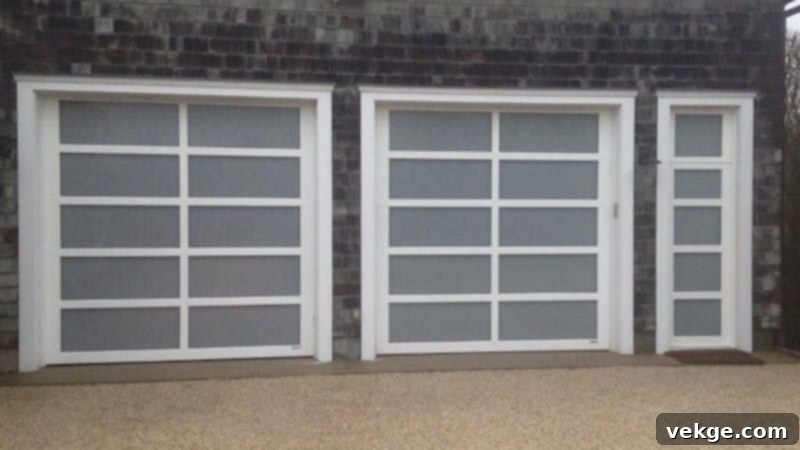
Fiberglass garage doors offer a unique combination of versatility and resilience, making them a popular choice for many homes. One of their most significant advantages is their ability to convincingly mimic the appearance of other materials, particularly natural wood, complete with realistic grain patterns. They are available in a wide array of colors and finishes, providing aesthetic flexibility without the demanding maintenance that real wood requires. Furthermore, fiberglass is less prone to denting than aluminum and boasts excellent resistance to saltwater corrosion, making it another superb option for coastal properties.
While fiberglass does offer some inherent insulation properties, double-layer or insulated versions significantly enhance thermal performance. It’s important to note, however, that while durable, fiberglass can be susceptible to fading over extended exposure to direct sunlight and may become brittle or crack in extremely cold temperatures. Despite these considerations, fiberglass provides a good balance of aesthetic appeal, moderate durability, and relatively low maintenance, positioning it as a strong contender for various home styles and climates.
Here are some helpful tips for choosing fiberglass for your custom garage door:
- Opt for Double-Layer or Insulated Fiberglass: For superior thermal performance, energy efficiency, and overall durability, always choose double-layer fiberglass doors that include an insulation core. This enhances both comfort and structural integrity.
- Assess Wood Grain Realism: If you’re seeking the look of wood without the upkeep, carefully evaluate the quality of the faux wood grain. High-quality fiberglass designs can be remarkably realistic, offering a sophisticated alternative.
- Consider Climate Limitations: Be aware of fiberglass’s potential vulnerability to extreme cold, which can lead to brittleness. If you live in a region with consistently severe winter temperatures, discuss this concern with your supplier and explore suitable protective measures or alternative materials.
- Fade Resistance: In areas with intense, prolonged sun exposure, inquire about UV-resistant coatings or finishes to minimize fading over time and maintain the door’s vibrant appearance.
- Ease of Repair: Minor scratches or dings on fiberglass can often be repaired more easily than on some other materials, contributing to its long-term aesthetic value.
Composite Garage Doors
Composite garage doors represent an innovative and increasingly popular choice, particularly for environmentally conscious homeowners. These doors are typically manufactured from a blend of recycled wood fibers and synthetic resins, creating a material that offers the best of several worlds. They boast the robust strength and low maintenance of steel combined with the classic beauty and texture of natural wood, all while often being an eco-friendly option due to their recycled content.
Unlike natural wood, composite materials are engineered to be highly resistant to rot, warping, cracking, and pests, significantly reducing long-term maintenance needs. They are also excellent insulators, providing superior thermal performance that contributes to energy savings and improved comfort in your garage. Composite doors offer a wide range of design flexibility, allowing for intricate panel designs, realistic wood finishes, and various color options. They are a superb choice for those who value aesthetics, sustainability, exceptional durability, and minimal upkeep, providing a high-performance solution that mimics premium wood without its drawbacks.
Here are some valuable tips for choosing composite materials for your custom garage door:
- Check Recycled Content: If eco-friendliness is a primary concern, inquire about the percentage of recycled materials used in the composite door’s construction to ensure it aligns with your sustainability goals.
- Ensure UV-Treatment: Verify that the composite material is UV-treated or contains UV inhibitors. This is crucial for maintaining color stability and preventing fading or degradation due to prolonged sun exposure.
- Balance Performance and Aesthetics: Composite materials can vary significantly in their composition and properties. Look for a product that strikes a good balance between structural strength, insulation capabilities (high R-value), and realistic aesthetic appeal (e.g., convincing wood grain imitation).
- Consider Long-Term Value: While the initial cost of composite doors might be higher than some alternatives, their exceptional durability, low maintenance, and energy efficiency often result in significant long-term savings and increased home value.
- Warranty and Reputation: Choose composite doors from reputable manufacturers known for quality and offering comprehensive warranties to protect your investment.
Factors to Consider When Choosing Your Garage Door Material
With such a diverse array of materials available, pinpointing the perfect custom garage door for your home requires careful consideration of several key factors:
- Home Architecture & Style: Your garage door should complement your home’s existing design. Traditional homes often suit wood or faux wood steel doors, while modern residences might benefit from glass, aluminum, or sleek steel. Ensure the material and style enhance your home’s overall aesthetic.
- Local Climate & Weather Conditions: The environment plays a huge role. Coastal areas with salt spray will benefit from rust-resistant materials like aluminum or vinyl. Humid climates require materials resistant to rot and warping (steel, vinyl, composite), while extreme cold might challenge fiberglass. Consider insulation for hot or cold climates.
- Budget & Cost: Garage door materials range widely in price. Wood and high-end composites are typically at the higher end, while steel and vinyl often offer more budget-friendly options. Factor in not just the initial purchase and installation cost but also long-term maintenance expenses.
- Maintenance Commitment: How much time and effort are you willing to invest in upkeep? Wood requires regular painting/staining, while vinyl and steel are much lower maintenance. If you prefer a “set-it-and-forget-it” solution, prioritize materials known for their minimal care.
- Durability & Security: Consider the level of protection you need. Steel and some composite doors offer superior strength and resistance to impacts and forced entry. If your garage stores valuables or provides direct access to your home, enhanced security features are paramount.
- Energy Efficiency: An insulated garage door can significantly impact your home’s energy bills and the comfort level of your garage space. If your garage is attached to your home or used as a living area, prioritize materials with high R-values (insulation ratings).
- Personal Preference: Ultimately, your personal taste in aesthetics and desired functionality should guide your decision. The best material is one that you love looking at every day and that meets your practical needs.
Wrapping Up
Choosing the right material for your custom garage door is a pivotal decision that impacts not only the visual appeal of your home’s exterior but also its functionality, security, and long-term value. As we’ve explored, each material—from the classic elegance of wood to the modern resilience of steel, the transparency of glass, the corrosion resistance of aluminum and vinyl, the versatility of fiberglass, and the eco-friendly strength of composites—offers a unique set of advantages and considerations.
When making your final selection, carefully weigh your local climate, the architectural style of your home, and the level of maintenance you are prepared to undertake. Don’t forget to factor in aspects like insulation needs for energy efficiency and the overall durability and security required for your peace of mind. By making a thoughtful and informed choice, your custom garage door will not only meet your functional needs but will also serve as a striking design element that enhances your home’s curb appeal and provides long-lasting satisfaction for years to come.
